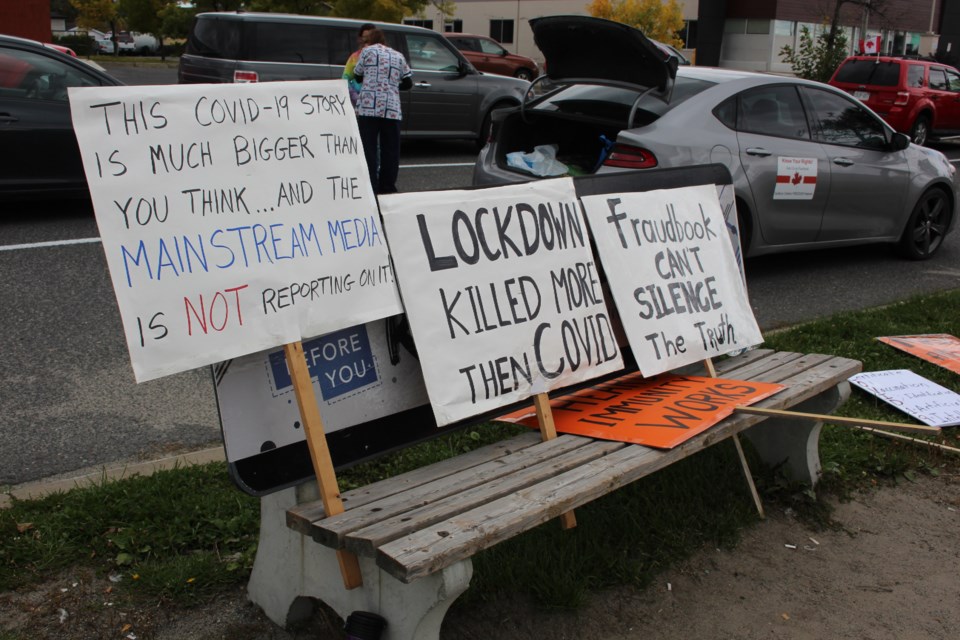When the COVID-19 pandemic hit Canada a year ago, in March 2020, most people were surprised and scared, and more inclined to follow public health guidelines.
As the pandemic dragged on, though, a percentage of the population began pushing back against health guidelines, while others push back against mask wearing and vaccines.
“As time started to move forward, this is where we had certain people that were being resistant towards certain guidelines,” said Science North staff scientist Bruce Doran.
There are now organized protests (and lots of activity on the internet) related to anti-mask, anti-lockdown and anti-vaccine movements.
“Unfortunately, those people, it’s really hard to reach them,” said Doran. “They are so ingrained in that ideology that even if you present them with good, accurate data, and good talking points. they may not listen to it.”
He suggests if you have someone of the above description in your life, you not attack their belief system, as that will just further isolate them and send them “down the rabbit hole.” Instead, talk about something completely unrelated to the pandemic, such as sports.
In some parts of the world — the U.S. and Brazil come to mind for Doran — public health measures such as mask-wearing have become politicized.
“They use that as ammunition to get their agenda across,” Doran said.
In Canada and most other places in the world, politicians have mostly followed the lead of public health officials in making decisions related to the COVID-19 pandemic.
“At least there’s more of a consistent messaging in most areas around the world where we’re trying to do that,” said Doran.
There are times, however, when messaging around the pandemic has been mixed (e.g. when Chief Public Health Officer of Canada Dr. Teresa Tam advised against mask-wearing early in the pandemic) and when rules don’t appear to make immediate sense (such as keeping certain businesses or services open, when others must stay closed).
“And that’s where people might be resistant in following certain rules, because it just doesn’t make sense, and I completely understand why,” Doran said.
All of this has happened alongside what’s been coined the “infodemic” by the World Health Organization. This is the word they’re using to talk about the “massive amount of information” - not all of it accurate - that has come about the COVID-19 pandemic.
A January virtual panel hosted by Science North and Laurentian University explored this topic.
“Unfortunately, with this massive amount of information that’s there, it’s really easy to creep in misinformation, and then that misinformation can spread just like a virus,” Doran said.
While it’s not likely you’re going to change the mind of conspiracy theorists, most people, when faced with massive amounts of information (or misinformation) about COVID-19, just aren’t sure what to believe, he said.
That’s the origins of vaccine hesitancy, or those who don’t know whether or not they want to go ahead with vaccination.
“With these people that are on the fence, if they come across information, they might get scared very quickly about vaccines,” Doran said.
“And that’s where these people need to get the proper information. I always tell people if you’ve got questions about vaccinations, talk to a vaccine expert, talk to your doctor.
“Don’t look at these social media posts.”
According to Statistics Canada, in a survey done in September (before any COVID-19 vaccines were approved), three-quarters (75 per cent) of Canadians aged 12 and older, or approximately 22.3 million people, indicated that they would be somewhat or very likely to get a COVID-19 vaccine.
So what’s next when it comes to pushback related to COVID-19 public health measures?
Doran said he figures that will be people possibly needing COVID-19 booster shots because of the virus mutating or people continuing to have to wear masks in public to protect those who are still unvaccinated.
If you’d like to learn more about some of these topics, Science North has a couple of upcoming virtual seminars. Doran and Science North colleague Allan Collier will present a panel entitled “The Evolution of Vaccines: the Fight Against COVID-19” March 18 at 12 p.m.
Doran, joined by Hugh Kruzel, chair of CARP Sudbury, will present a virtual talk called “The Virus of Misinformation Workshop for Seniors (55+) on March 25 at 11 a.m.
You can sign up for these seminars online through Science North’s website.
